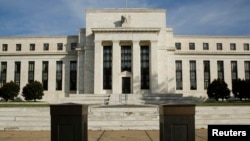Federal Reserve Governor Lael Brainard warned against raising key U.S. interest rates too soon, saying despite the improving economic outlook — global weakness poses a downside risk to already low inflation in the United States.
While the U.S. economy has proved “reassuringly resilient," Brainard says the economic momentum may not be strong enough to overcome deflationary risks from abroad.
Concerns about slowing growth in China, the world’s second largest economy, has roiled financial markets in the past two months, causing the central bank to delay raising its benchmark interest rates which have been at record lows since 2008.
The Fed has not ruled out a modest rate hike before the end of the year, but Brainard says sluggish wage growth in the U.S. combined with increased market volatility could make the U.S. more vulnerable to external risks. U.S. monetary policy is based on the Fed’s dual mandate of full employment and moderate inflation.
While U.S. unemployment, now at 5.1 percent is close to full employment, inflation remains well below the Fed target rate of 2 percent. Despite healthy consumer demand in the U.S., the strong dollar continues to weigh on U.S. exports, further widening trade deficits and according to Brainard, exacerbating the downside risk from slower global growth.
Brainard, a voting member of the Federal Open market Committee — the Fed's policy-making body — made the comments at the annual meeting of the National Association for Business Economics (NABE) in Washington, DC.




